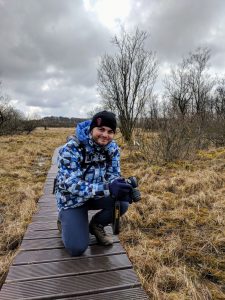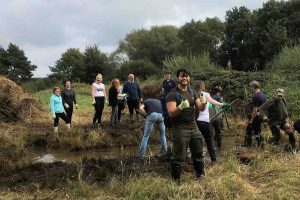A study of developing self-efficacy in undergraduate biologists at the University of Hull by the HE Bioscience Teacher of the Year, Dominic Henri.
I strongly believe that the process of Higher Education should provide the opportunity for students to overcome a wide range of barriers, which can then be drawn upon to bolster self-belief in the pursuit of their personal aspirations.
The development of this sort of self-confidence, called self-efficacy, or task specific self-belief, has been shown to provide a wide-range of benefits for students, such as improved achievement, persistence through difficulty, more buoyant mental-health, and greater employability.
Student self-efficacy is something that can be developed by lecturers and thoughtful course design. A large amount of self-efficacy development stems from overcoming challenges, and as such, university courses must be challenging.
However, introducing a sense of challenge into a course can have the opposite effect to that intended, if not done correctly, particularly if you overwhelm a student’s perception of their ability to succeed.

Dr Dominic Henri, lecturer in Behavioural Ecology, director of student experience for the school of environmental sciences, and recipient of this year’s HE Biosciences Teacher of the Year Award (Photo credit: Dominic Henri)
Putting together my application for the RSB HE Biosciences Teacher of the Year award was a very important process for me, because it gave me time to collate a personal teaching philosophy and a plethora of innovations and experiences into a conceptual framework for developing student self-efficacy.
My framework for developing students’ self –efficacy into a course comprises of three key steps:
Step 1. Integrate structured skills-development into the content of your course
When designing a HE course, lecturers need to address the development of skills that are integral for completing the course, such as group-work, time-management, independent learning strategies, leadership and autonomy.
Students must then be given the tools, or a process, that will help them develop these skills, and they must also be able to practice these in low-stake environments. I believe that most students want to do better but do not know how to get there, and that lack of control may hinder their efforts to improve.
Have a think about what deficiencies are limiting achievement and engagement on your modules and how you can improve these. Follow this with discussions with your skills-development team about what tools or best practice is available to enhance student development of those skills.
For example, critical thinking can be developed using an inquisitive method that is teachable and easy to integrate into assessment, which may be more impactful than an abstract lecture on what critical thinking is and why it is important.
Encourage group-working and assessor-student dialogue at this stage, as individuals connected to a community of practice are much harder to overwhelm than isolated individuals.
Step 2. Create authentic experiences to master the skills
Overcoming challenge is inherently difficult, and requires motivation to attempt to do so. Therefore such challenges must resonate with student aspirations.
For example, on our practical conservation module most of the students want to work in conservation after graduating, so the assessments are aligned with roles that the students might undertake in conservation jobs, such as writing a blog to promote public engagement or consultancy roles evaluating the effectiveness of projects for local conservation organisations. I find students take more from these experiences because they directly relate to what they aspire to be.
Self-efficacy is also task-specific; for example, my self-belief in my ability to write a good blog post is not buoyed by my experiences writing scientific papers, even though they are on similar topics. Similarly, graduate self-efficacy is best served by having opportunities to practice key processes that they will have to perform ‘on the job’.
In my experience, the best way to promote motivation and self-efficacy is to ensure that these challenges are considered to be authentic and valued by students, so they respond positively to these chances to develop and grow skills that they feel will be useful.
Linking challenges to professional problems and tasks is a relatively straight-forward way of helping students appreciate the value of their education and applications it may have after graduation.

The Practical Conservation module is an asset to both students and the University of Hull. This module has provided valuable practical experience which I would not have gained otherwise. The quantity of transferable skills which I have gained is also invaluable” 2017/18 student Module Evaluation Response. (Photo credit: Dominic Henri)
A good ideas is to look at what careers your students go into and engage with industry-stakeholders to see what kinds of tasks might be appropriate to help develop the skillsets they look for in candidates. These processes can have the added benefit of revealing skills and experiences that recent graduates going into these careers are lacking.
The students then engage with difficult and unfamiliar tasks, such as organising their own conservation placement, because the challenge aligns closely with their career aspirations and their interests, and thus develop confidence in transferable skills.
There are a huge variety of careers available to biosciences graduates. Getting to know the aspirations of the students on your course and tailoring experiences to those aspirations is an important road to improving student satisfaction and boosting student confidence in their employability.
Step 3. Encourage recognition of progress and areas for improvement
Reflection is a core aspect of learning, and particularly so for skills development.
Reflection can help overcome a major barrier to the development of self-efficacy: personal perception of progress. The external environment has a significant impact on an individual’s sense of self-efficacy, particularly the difficulty of the current task.
Students may assess their skills based on how they “feel” they are doing, rather than on how they are actually doing.
This is problematic, because the sense of challenge must increase as students’ progress through education. So, in order to maximise perception of progress, students must be given the opportunity to thoughtfully and carefully reflect to their progress throughout.
Some methods of reflection are:
- Requesting the kinds of feedback students would like when they hand in work, such as allowing students to attach a cover letter to their work, with room for responses from the lecturer.
- Students identifying the strengths and weaknesses in their own work in relation to criteria or standards before handing it in for feedback. This type of reflection is very effective if used on draft assignment submissions.
- Reflecting on their achievements and selecting work in order to compile a portfolio.
- Reflecting on achievement milestones and reflecting back on progress, before looking forward to the next stage of action, for example, regularly updated career action plans combined with tutor discussion.
Putting it all together!
For me, one of the most important questions to answer through my teaching is: how are my students going to apply this in the future?
My greatest teaching-related anxiety is that the students will think of education as something that is to be learned, tested on and then forgotten.
Using the above steps to encourage students to develop a key skill that is applicable to their wider university and graduate paths is my way of trying to make my teaching about personal progress.
My hope is that each and every interaction between me and my students has the potential to become a touchstone in that student’s personal development, which they look back upon when faced with a challenge and say “I did that, so I can do this too.”

